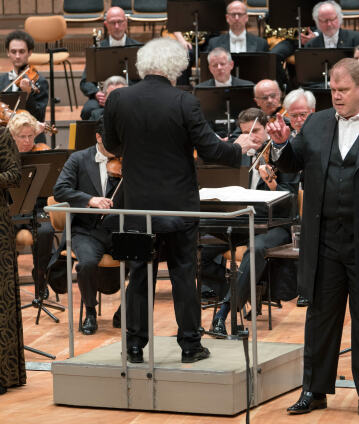Simon Rattle conducts “Parsifal”

Richard Wagner’s Parsifal, which once again deals with Wagner’s metaphysical lifelong theme of redemption, is characterised by scintillating, almost narcotic music of unparalleled allure. In 2018, Simon Rattle conducted the work in a performance with a top-class ensemble including Stuart Skelton and Nina Stemme. The audience reacted enthusiastically, and the press also praised this “shimmering, iridescent, and lustrous Parsifal for the 21st century”.
“In Parsifal, the final effort of a genius which compels our homage, Wagner tried to drive his music on a looser rein and let it breathe more freely. We have no longer the distraught breathlessness that characterises Tristan’s morbid passion or Isolde’s wild screams of frenzy; nor yet the grandiloquent commentary on the inhumanity of Wotan. Nowhere in Wagner’s music is a more serene beauty attained then in the prelude to the third act of Parsifal and in the entire God Friday episode.” Claude Debussy, who wrote these lines in 1903, had visited the Bayreuth Festival in 1888 and 1889, and had what could be called a love-hate relationship with Wagner. He had, for example, the greatest respect for the groundbreaking harmonic innovations of Tristan and the “luminous beauty of the Ring”. On the other hand, he took exception to the way Wagner’s music aimed at nothing less than the “total seizure” of its listeners, and made fun of the “German obsession for pounding the same intellectual nail, again, and again, and again; the fear of not being understood which results in endless repetition”.
It may at first seem surprising that Debussy admitted Parsifal of all works to be a “serene beauty”. After all, Wagner’s work, entitled a “Bühnenweihfestspiel” (festival drama for the consecration of the stage), which brings together Arthur Schopenhauer’s reception of Buddhist teachings with the concept of Christian salvation in a feat of religious art, is a puzzle to even diehard Wagnerians. Debussy, too, was perplexed by – if not opposed to – the “moral and religious ideas” in Parsifal, but could enjoy music that, in contrast to the leitmotif technique of the Ring, does not immediately attempt to provide an answer to every question.
Following his performances of the four parts of the Ring and of Tristan in the last few years, it will be fascinating to see how Sir Simon Rattle approaches Wagner’s opus ultimum this season. After three performances of Parsifal at the Easter Festival in Baden-Baden in a staging by Dieter Dorn, the Philharmonie now becomes the venue for the “Bühnenweihfestspiel” for two evenings. In these concert performances, in which the Berliner Philharmoniker under the direction of their chief conductor are supported by the Rundfunkchor Berlin, the title role is sung by the Australian tenor Stuart Skelton, who has already worked together with Rattle as Tristan. The Swede Nina Stemme, who takes on the role of the eternally damned seductress Kundry, has been one of the greatest soprano Wagner specialists for many years. Like Stemme, Franz-Joseph Selig, who sings the exhausting role of the wise Grail knight Gurnemanz, also has Bayreuth experience. The other roles are also prominently cast with Gerald Finley as the Grail King Amfortas, suffering an incurable wound, and Evgeny Nikitin as the scheming magician Klingsor (Debussy: “His malicious hatred is marvellous...”).
© 2018 Berlin Phil Media GmbH
Related interviews